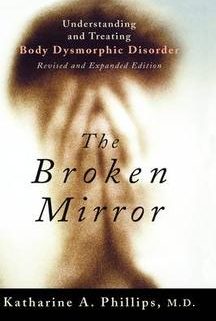The Broken Mirror
The Broken Mirror – Understanding & Treating Body Dysmorphic Disorder
By Katherine A Phillip
People who have BDD not only dislike some aspect of how they look, they’re preoccupied with it. When BDD is severe, friendships, intimate relationships and work disintegrate. It affects 2% of the US population. Left untreated, it can lead to hospitalization and sometimes suicide. Katherine Phillips draws on years of clinical practice and detailed interviews with patients to write the first book on body dysmorphic disorder. She describes what is known about the disorder, what patients experience, what researches have learned about it, and what treatments seem helpful.
ABOUT THE AUTHOR, KATHERINE A PHILLIP
Phillips (psychiatry, Brown U. School of Medicine) makes a convincing case for taking a second look by drawing on years of clinical practice, research, and patient interviews. The evidence demonstrates that the obsession often causes sufferers to attempt suicide or become house bound and can be linked to eating disorders and depression. Suggesting new treatment methods (therapy, Prozac) and methods of assessing BDD, Phillips legitimizes a serious malady that many sufferers keep secret.
Dr. Phillips draws on years of clinical practice and detailed interviews with more than 200 patients to bring readers the first book on body dysmorphic disorder, or BDD, in which sufferers are obsessed by perceived flaws in their appearance.
HOW TO BUY?
You can purchase The Broken Mirror – Understanding and Treating Body Dismorphic Disorder ‘ from http://www.fishpond.com.au
(It is also available from all major bookshops in Australia.)
Published by: Oxford University Press Inc
ISBN: 0195121260
BOOK REVIEWS
“Dr. Phillips’ book is a landmark in the recognition and treatment of imagined uglyness. This book. beautifully written, provides a great deal of hope for patients with body dysmorphic disorder and their family members and should help speed recovery for countless sufferers of this common, fascinating, and disabling illness.”
Eric Hollander MD, Professor of Psychiatry, USA




Leave a Reply
Want to join the discussion?Feel free to contribute!